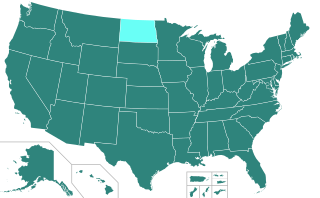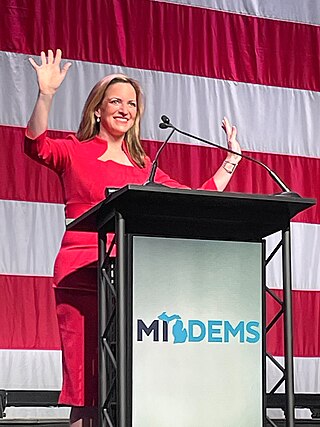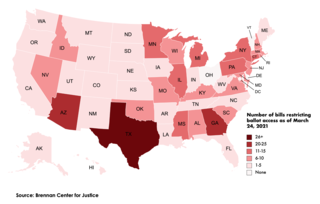Related Research Articles
Compulsory voting, also called universal civic duty voting or mandatory voting, is the requirement that registered voters participate in an election. As of January 2023, 21 countries have compulsory voting laws. Enforcement of the law in those countries varies considerably and the penalty for not casting a ballot without a proper justification ranges from severe to non-existent.

New Zealand is a representative democracy in which members of the unicameral New Zealand Parliament gain their seats through elections. General elections are usually held every three years; they may be held at an earlier date at the discretion of the prime minister, but that usually only happens in the event of a vote of no confidence or other exceptional circumstances. A by-election is held to fill an electorate vacancy arising during a parliamentary term. The most recent general election took place on 14 October 2023.

In political science, voter turnout is the participation rate of a given election. This is typically either the percentage of registered voters, eligible voters, or all voting-age people. According to Stanford University political scientists Adam Bonica and Michael McFaul, there is a consensus among political scientists that "democracies perform better when more people vote."

"Get out the vote" or "getting out the vote" (GOTV) describes efforts aimed at increasing the voter turnout in elections. In countries that do not have or enforce compulsory voting, voter turnout can be low, sometimes even below a third of the eligible voter pool. GOTV efforts typically attempt to register voters, then get them to vote, by absentee ballot, early voting or election day voting. GOTV is generally not required for elections when there are effective compulsory voting systems in place, other than perhaps to register first time voters.

In the politics of the United States, elections are held for government officials at the federal, state, and local levels. At the federal level, the nation's head of state, the president, is elected indirectly by the people of each state, through an Electoral College. Today, these electors almost always vote with the popular vote of their state. All members of the federal legislature, the Congress, are directly elected by the people of each state. There are many elected offices at state level, each state having at least an elective governor and legislature. There are also elected offices at the local level, in counties, cities, towns, townships, boroughs, and villages; as well as for special districts and school districts which may transcend county and municipal boundaries.
Rock the Vote is a non-profit liberal organization in the United States. Through registering new young voters, the group aims to "channel the energy among young people around racial, economic, and health justice into one of the most powerful actions they can take: voting."
In electoral systems, voter registration is the requirement that a person otherwise eligible to vote must register on an electoral roll, which is usually a prerequisite for being entitled or permitted to vote.

Voter suppression is a strategy used to influence the outcome of an election by discouraging or preventing specific groups of people from voting. It is distinguished from political campaigning in that campaigning attempts to change likely voting behavior by changing the opinions of potential voters through persuasion and organization, activating otherwise inactive voters, or registering new supporters. Voter suppression, instead, attempts to gain an advantage by reducing the turnout of certain voters. Suppression is an anti-democratic tactic associated with authoritarianism.
An absentee ballot is a vote cast by someone who is unable or unwilling to attend the official polling station to which the voter is normally allocated. Methods include voting at a different location, postal voting, proxy voting and online voting. Increasing the ease of access to absentee ballots is seen by many as one way to improve voter turnout through convenience voting, though some countries require that a valid reason, such as infirmity or travel, be given before a voter can participate in an absentee ballot. Early voting overlaps with absentee voting. Early voting includes votes cast before the official election day(s), by mail, online or in-person at voting centers which are open for the purpose. Some places call early in-person voting a form of "absentee" voting, since voters are absent from the polling place on election day.
Early voting, also called advance polling or pre-poll voting, is a convenience voting process by which voters in a public election can vote before a scheduled election day. Early voting can take place remotely, such as via postal voting, or in person, usually in designated early voting polling stations. The availability and time periods for early voting vary among jurisdictions and types of election. The goals of early voting are usually to increase voter participation, relieve congestion at polling stations on election day, and avoid possible discrimination against people with work and travel schedules that may effectively prohibit them from getting to the polls during the hours provided in a single election day.

Postal voting is voting in an election where ballot papers are distributed to electors by post, in contrast to electors voting in person at a polling station or electronically via an electronic voting system.

The youth vote in the United States is the cohort of 18–24 year-olds as a voting demographic, though some scholars define youth voting as voters under 30. Many policy areas specifically affect the youth of the United States, such as education issues and the juvenile justice system; however, young people also care about issues that affect the population as a whole, such as national debt and war.

Voter registration in the United States is required for voting in federal, state and local elections in the United States. The only exception is North Dakota, although cities in North Dakota may register voters for city elections. Voter registration takes place at the county level in many states and at the municipal level in several states. Most states set cutoff dates for voter registration and to update details, ranging from 2 to 4 weeks before an election; while a third of states have Election Day or "same-day" voter registration which enables eligible citizens to register or update their registration when they vote before or on election day.

The Voter Participation Center (VPC) is a U.S.-based 501(c)(3) non-profit organization that seeks to increase voter registration among young people, people of color, and unmarried women, a group it calls "The New American Majority." Its sister organization, the Center for Voter Information, is a 501(c)(4) organization that conducts get-out-the-vote campaigns. VPC runs a large direct mail program, sending voter registration materials to targeted voters. It also produces research material on demographic and voting trends. Between 2004 and 2020, they registered more than 4 million voters. Some election officials and campaigns have contested the group's methods of voter registration and voter turnout.
Vote.org, formerly Long Distance Voter, is a nonpartisan 501(c)(3) non-profit organization that is based in the United States. It provides online voter guides for every state, including voter registration forms, absentee ballot applications, and information on deadlines, directions, and ID and residency requirements.

Jocelyn Benson is an American democracy advocate, politician, and former academic administrator. Since 2019, she has been the 43rd Secretary of State of Michigan. She is a former dean of Wayne State University Law School, a co-founder of the Military Spouses of Michigan, and a board member of the Ross Initiative in Sports for Equality. Benson is the author of State Secretaries of State: Guardians of the Democratic Process.

There are five types of elections in the United Kingdom: elections to the House of Commons of the United Kingdom, elections to devolved parliaments and assemblies, local elections, mayoral elections, and police and crime commissioner elections. Within each of those categories, there may also be by-elections. Elections are held on Election Day, which is conventionally a Thursday, and under the provisions of the Dissolution and Calling of Parliament Act 2022 the timing of general elections can be held at the discretion of the prime minister during any five-year period. All other types of elections are held after fixed periods, though early elections to the devolved assemblies and parliaments can occur in certain situations. The five electoral systems used are: the single member plurality system (first-past-the-post), the multi-member plurality, the single transferable vote, the additional member system, and the supplementary vote.
Voter suppression in the United States consists of various legal and illegal efforts to prevent eligible citizens from exercising their right to vote. Such voter suppression efforts vary by state, local government, precinct, and election. Voter suppression has historically been used for racial, economic, gender, age and disability discrimination. After the American Civil War, all African-American men were granted voting rights, but poll taxes or language tests were used to limit and suppress the ability to register or cast a ballot. The Civil Rights Act of 1964 improved voting access significantly.
Debra Cleaver is an American nonprofit executive who founded Vote.org and VoteAmerica.

Following the 2020 United States presidential election and the unsuccessful attempts by Donald Trump and various other Republican officials to overturn it, Republican lawmakers initiated a sweeping effort to make voting laws more restrictive within several states across the country. According to the Brennan Center for Justice, as of October 4, 2021, more than 425 bills that would restrict voting access have been introduced in 49 states—with 33 of these bills enacted across 19 states so far. The bills are largely centered around limiting mail-in voting, strengthening voter ID laws, shortening early voting, eliminating automatic and same-day voter registration, curbing the use of ballot drop boxes, and allowing for increased purging of voter rolls. Republicans in at least eight states have also introduced bills that would give lawmakers greater power over election administration after they were unsuccessful in their attempts to overturn election results in swing states won by Democratic candidate Joe Biden in the 2020 election. The efforts garnered press attention and public outrage from Democrats, and by 2023 Republicans had adopted a more "under the radar" approach to achieve their goals.
References
- 1 2 3 Eversley, Melanie (November 27, 2019). "Can an App Drive More Voters to the Polls in 2020? This Entrepreneur Has High Hopes It Will". Fortune. Retrieved July 22, 2022.
- ↑ "TurboVote: "Netflix" for Voter Registration". Harvard Magazine. September 13, 2011. Retrieved July 23, 2022.
- ↑ "Meet Democracy Works CEO Luis Lozada!". Democracy Works. Retrieved October 10, 2023.
- 1 2 "About TurboVote". Democracy Works. Retrieved July 23, 2022.
- 1 2 Sutton, Kelsey (June 27, 2016). "With help from President Obama, BuzzFeed launches get-out-the-vote initiative". Politico. Retrieved July 23, 2022.
- ↑ Davidi, Adam (October 24, 2013). "Bringing innovation in government to life: Q&A with Kathryn Peters". The Guardian. Retrieved July 23, 2022.
- ↑ Pierce, David (November 3, 2020). "The messy world of data behind tech's campaign to get out the vote". Protocol. Retrieved July 23, 2022.
- ↑ Kuffel, Veronica (November 5, 2020). "Music industry creates initiatives to increase voter turnout". The Badger Herald. Retrieved July 23, 2022.
- ↑ "Starbucks, Airbnb, Democracy Works aim to boost U.S. voter turnout". Reuters. March 23, 2016. Retrieved July 23, 2022.
- ↑ Rose Dickey, Megan (September 15, 2020). "Uber wants to help its drivers and delivery workers register to vote". TechCrunch. Retrieved July 23, 2022.
- ↑ Gartenberg, Chaim (September 18, 2018). "Instagram will use ads to help users register to vote". The Verge. Retrieved July 23, 2022.
- ↑ Darmon, Aynslee (October 27, 2020). "Lady Gaga Makes A Statement With Viral Voting Video". ET Canada. Archived from the original on November 1, 2020. Retrieved July 23, 2022.
- ↑ "2022 Impact Report" (PDF). Democracy Works. Retrieved October 10, 2023.
- ↑ Rodriguez, Bianca; Zaiets, Karina; Elkin, Elizabeth (November 6, 2018). "Many voters confused over polling locations this year". The Columbia Missourian. Retrieved July 23, 2022.
- ↑ Klepper, David (October 16, 2020). "Scammers seize on US election, but it's not votes they want". The Associated Press. Retrieved July 23, 2022.
- ↑ Huseman, Jessica (March 11, 2019). "Facebook and Twitter Turned to TurboVote to Drive Registrations. Officials Want Them to Turn Away". ProPublica. Retrieved July 23, 2022.